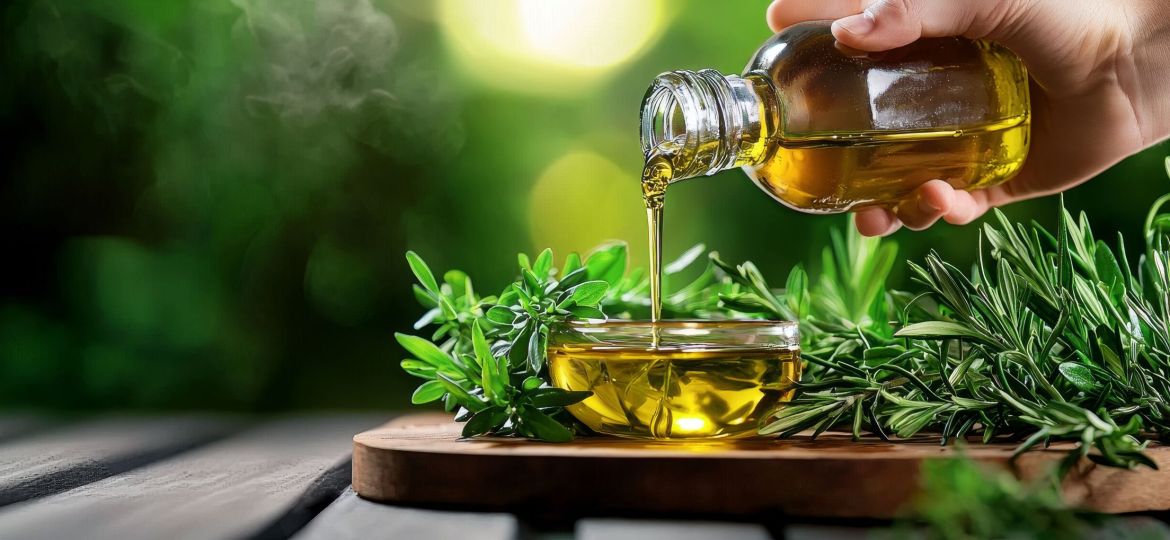
In Indian folklore, neem has a magical origin story. It is believed that when divine beings carried the potion of eternal life to the heavens, some drops fell on a neem tree, imbuing it with extraordinary healing powers. Native to the Indian subcontinent, the neem tree (Azadirachta indica) has been revered for centuries by Ayurvedic practitioners who have used its bark, leaves, flowers, seeds, and fruits for their therapeutic properties.
Today, neem comes in many forms—oil, tea, honey—and is renowned for benefiting your skin, hair, immune system, and more. You can even grow it in your garden to use as a natural, chemical-free insect repellent and herbicide. Here’s everything you need to know about the benefits and uses of neem oil.
What Is Neem Oil?
Known as the “Indian lavender tree,” neem has been a cornerstone of Ayurvedic and Siddha medicine in India, Sri Lanka, Nepal, Pakistan, and the Maldives for centuries. In Sanskrit, neem is called “arista,” meaning “perfection, joy, and protection,” and “nimba,” which means “to give health.” Neem oil is rich in antioxidants, including quercetin, a plant pigment with well-documented health benefits. It also contains other active compounds like nimbi, salannin, azadirachtin, and various fatty acids.
Neem oil is typically extracted through cold-pressing the seeds or by soaking crushed kernels in hexane. Cold-pressing preserves the oil’s beneficial compounds, while hexane extraction is generally used for soaps.
7 Health Benefits of Neem Oil
The neem tree’s various parts—seeds, leaves, flowers, and bark—contain a wealth of nutrients and plant substances that enhance health. For over a thousand years, natural health practitioners have recommended neem for treating ailments like snake bites, malaria, and even constipation. Here are some of the most popular health-related uses for neem and its products:
1. Supports Digestive Health
Neem has long been used to promote gut health and digestion. In Ayurvedic medicine, neem bark is used to treat stomach disorders like bloating and gas. Modern research has shown that neem extract has gastroprotective properties. A 2004 study found that taking 30-60 mg of neem extract twice a day had a positive effect on stomach ulcers.
2. Aids Detoxification
Neem doesn’t just support digestion—it also helps cleanse and detoxify your body. Its bark has antimicrobial properties that protect against harmful gut invaders. By promoting beneficial bacteria (probiotics) and inhibiting harmful ones, neem helps maintain a healthy gut environment.
3. Encourages Radiant Skin
Neem oil is well-known for its skin-boosting properties. In Siddha medicine, neem oil is used in herbal remedies to treat skin conditions like eczema, psoriasis, ringworm, and even leprosy. Its fatty acids, vitamins, and antioxidants help rejuvenate the skin, reducing the appearance of wrinkles and fine lines.
4. Promotes Healthy Hair
Neem oil benefits your hair too, making it stronger and more vibrant. Its anti-fungal, antibacterial, and anti-inflammatory properties help improve scalp health, promoting healthier hair roots. Neem oil can also combat dandruff by nourishing the scalp and preventing fungal growth. Additionally, neem oil is effective at eliminating lice in a single treatment (although you will still need to remove the nits manually).
5. Improves Oral Health
Long before toothbrushes were invented, Ayurvedic practitioners used neem twigs to clean teeth, soothe toothaches, and prevent gum disease. Today, neem bark is a common ingredient in natural oral care products, including toothpaste and mouthwash. Its antibacterial properties help reduce plaque buildup, prevent gum inflammation (gingivitis), and combat bad breath.
6. Acts as a Natural Contraceptive
Some studies suggest that neem may have anti-fertility effects, acting as a natural contraceptive. Research has shown that neem leaf extract can significantly reduce sperm motility, and studies on animals suggest neem oil can prevent conception by inhibiting the implantation of a fertilized egg. However, neem is not recommended as a primary form of birth control, and you should always consult a doctor before using it for this purpose.
7. Serves as a Powerful Antioxidant
Neem oil contains quercetin, a powerful antioxidant that scavenges free radicals in the body. This helps prevent premature cell death and supports overall cellular health. Neem’s antioxidant properties make it a valuable ally in promoting longevity and protecting the body from oxidative damage.
Types of Neem
Neem is available in various forms, each with its unique benefits:
- Neem Bark: Ground into powder, neem bark is used to protect the digestive system, repel harmful microorganisms, and act as a natural insecticide.
- Neem Leaves: Used as poultices or brewed into tea, neem leaves help reduce indigestion, fever, and promote heart health.
- Neem Oil: Extracted from the seeds, neem oil is used for clear skin, digestive health, contraception, and pest control.
- Neem Tea: Made from whole or ground leaves, neem tea has a bitter taste and is often blended with other herbs like licorice root, fennel, or orange peel.
- Neem Honey: Collected from hives near neem groves, this honey supports digestion and offers strong antibacterial and anti-inflammatory properties.
Uses of Neem Oil
Neem oil is incredibly versatile, offering numerous health benefits and applications in your daily routine. From skincare to pest control, neem oil is a valuable addition to your wellness toolkit.
Skin Care
Neem oil is an excellent natural remedy for skin issues like acne, psoriasis, and dry skin. It’s packed with antioxidants and fatty acids that promote healthy, youthful skin.
How to Use: For acne, apply undiluted neem oil directly to the affected area using a cotton swab. For larger areas of dry or irritated skin, mix 10 drops of neem oil with a carrier oil (such as coconut or jojoba oil) and massage it into the skin. You can also mix neem oil with aloe vera gel for a less oily option.
Oral Care
Neem’s antibacterial properties make it a fantastic addition to your oral hygiene routine.
How to Use: Add a few drops of neem oil to your toothpaste or floss to help combat plaque, gingivitis, and bad breath. You can also massage neem oil along your gum line or use it in mouthwash.
Hair Care
Neem oil strengthens the hair and improves scalp health. It’s effective in treating dandruff, dry scalp, and lice.
How to Use: Add 10 drops of neem oil to your shampoo or conditioner for a dandruff-fighting boost, or dilute neem oil with a carrier oil and massage it into your scalp to treat lice.
Gardening
Neem oil is a natural pesticide and fungicide, safe to use on plants to protect against pests and fungal diseases.
How to Use: To make a homemade pesticide, mix 1 teaspoon of neem oil with 1 quart of water and 1/8 teaspoon of liquid soap. Spray directly onto plant leaves to protect against aphids, termites, and other harmful insects.
Pets
Neem oil is a great natural insect repellent for pets, helping to prevent flea and tick infestations.
How to Use: For a pet shampoo, add 25 mL of neem oil to 400 mL of your pet’s regular shampoo. Alternatively, you can make a spray by simmering neem leaves in water and using it as needed.
Side Effects & Safety of Neem
Neem is generally safe for external use, but if you have sensitive skin, always dilute the oil with a carrier oil. Internal use may cause digestive issues like diarrhea or vomiting, so use caution before ingesting neem oil. It’s recommended that adults avoid exceeding a dose of 0.2 mL/kg of body weight.
Neem may also have temporary anti-fertility effects, so it’s not advised for those trying to conceive. Always consult with a healthcare provider before using neem, especially if you’re taking medications or have specific health concerns.
Final Thoughts
Neem has earned its place as a “miracle tree” due to its incredible health benefits, from digestive support to skin rejuvenation, and even its ability to fight harmful organisms. Whether you’re using it for personal care or pest control, neem is a powerful, all-natural remedy with a rich history of healing. Always ensure you’re using the highest quality neem products, and consult with a healthcare professional if you’re considering adding neem to your regimen.
